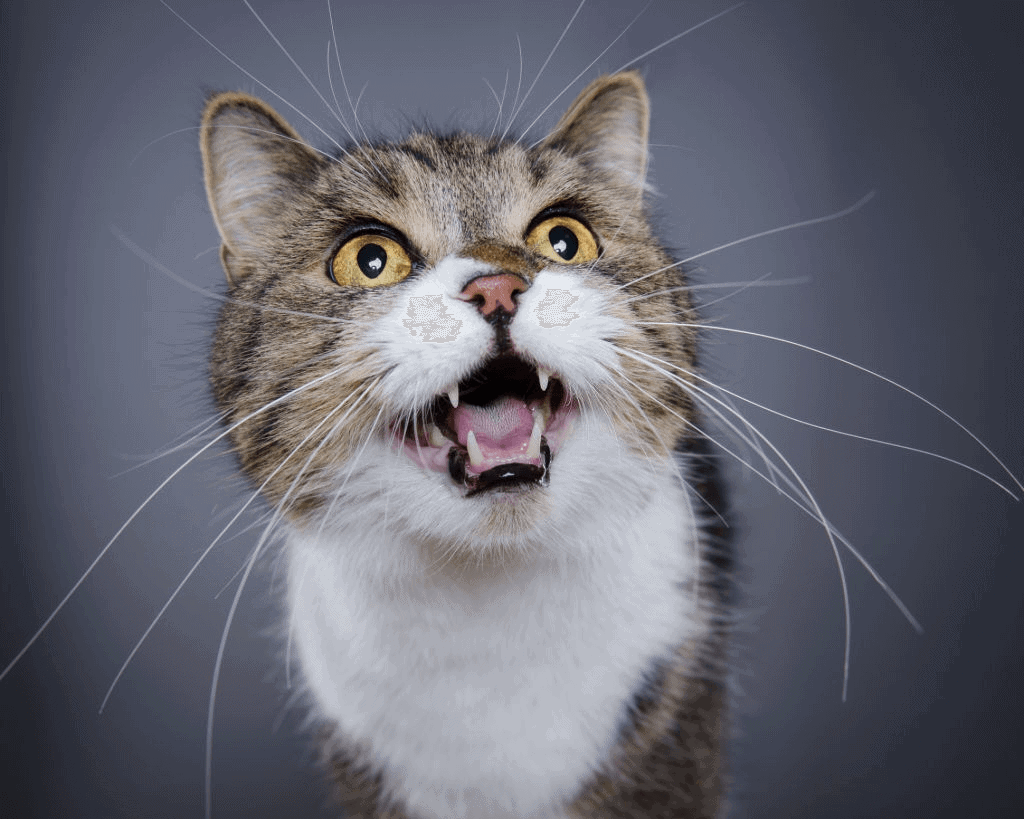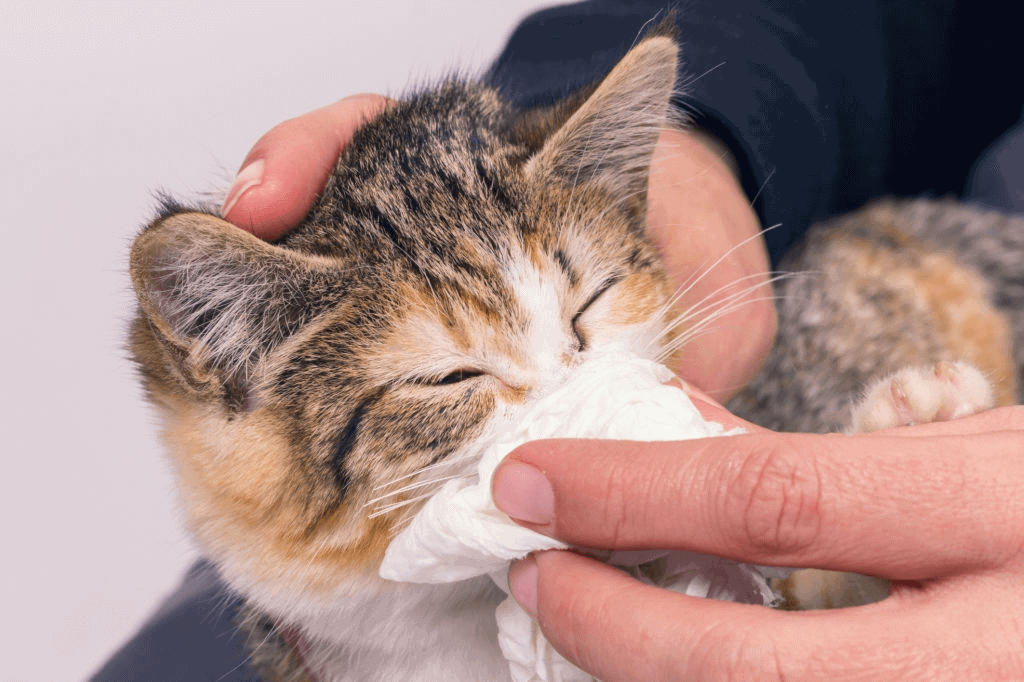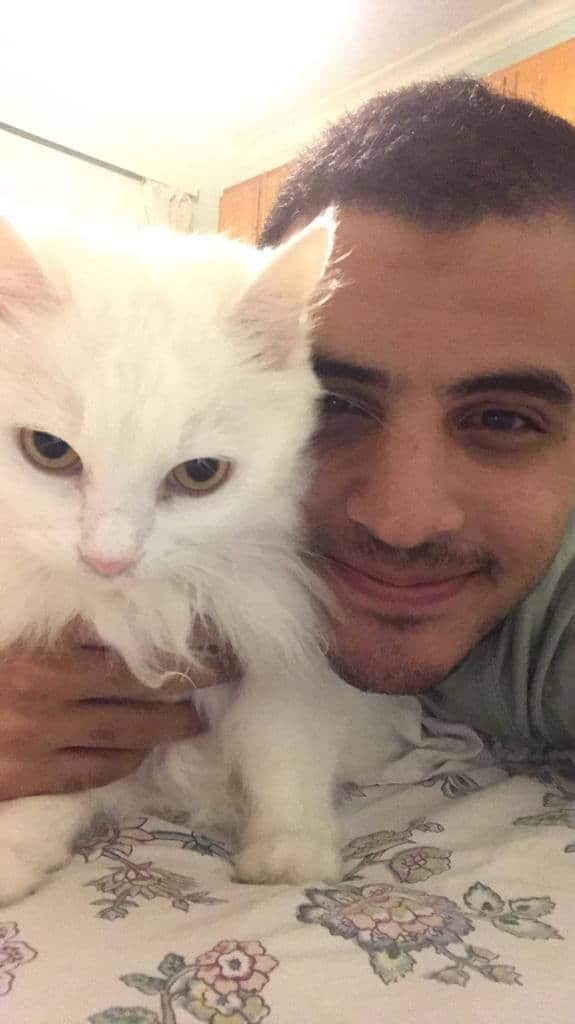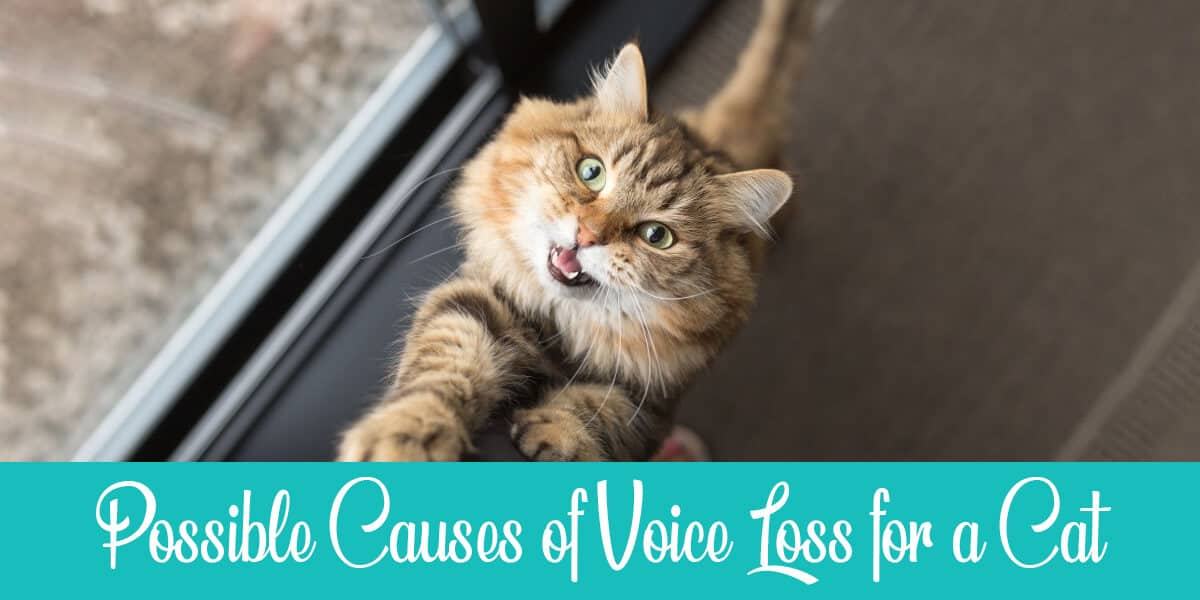We love meows, no one can deny that. Yes, we might get annoyed if they wake us up in the middle of the night. But once they stop, we immediately miss them!
Has your cat lost voice? First of all, don’t freak out. This doesn’t necessarily mean he’ll stop nagging you with those captivating charms.
In fact, you might be grateful that this happened. Lost voice can be an alarm for serious conditions that need immediate attention. Like what? Keep reading to know the top 6 conditions affecting a cat’s voice.
Table of Contents
How Exactly Does a Cat Meow?

Before we begin investigating the conditions, we have to take a brief look at the science behind phonation. We won’t dive too technical, though. Just enough to make sure you know all the technical jargon that comes up ahead.
All animals, including humans, produce their voices from a rigid chamber present at the beginning of the airway. Scientifically, it’s known as the larynx, but people sometimes call it the voice box.
The inside of the larynx is lined with a mucous membrane, just like the one lining your mouth. However, in the larynx, it doesn’t run as smoothly. It has two sets of projections known as vocal folds and ventricular folds.
Vocal Folds: The True Vocal Cords
The vocal folds are a bunch of fibers and muscles present around the middle of the larynx.
At rest, these muscles remain in a relaxed position with a gap in between to maintain an open airway.
When we begin talking, muscles start to contract and the gap partially closes. This restricts the movement of the exhaled air and produces the distinctive voice of each individual.
Ventricular Folds: The False Vocal Cords
Up till now, we share the same phonation process with our beloved furry friends. But when it comes to the ventricular folds, the uniqueness of cats starts to unfold.
Ventricular folds can be found slightly above vocal folds. They look somewhat similar. The only difference lies in the gap between folds on each side.
The ventricular gap is a lot wider than the vocal’s, that’s why it doesn’t participate much in human phonation.
However, in cats, these folds are responsible for one of our most favorite sounds, purring. Cat muscles are able to vibrate these folds while maintaining their airway open, something that we don’t see in any other animal.
Now that we covered the basic anatomy, we can start diagnosing the problem. Let’s see!
6 Possible Reasons Why Your Cat Lost its Voice
1. Your Cat May Not Feel Like Meowing
Believe it or not, cats aren’t supposed to meow by nature. If your cat is able to produce other voices, like purring and chirping, there’s nothing to worry about.
Cats Only Meow for Communication
If you’ve been around feral cats, you’ll notice that they rarely meow at each other. And by meowing, I mean the soft and cute sound that melts our hearts.
However, they can growl, hiss and yowl to mark their territory and pull up those feisty fights. Aside from this, cats understand each other via scent and body movement. But humans, unfortunately, can’t understand either of these, can you?
The Many Meanings of the “Meow”
When cats were domesticated, they began meowing to communicate with their owners. According to Psychology Today, this is what your cat might be trying to say:
- A short meow: a friendly greeting
- Multiple short meows: excited greetings, typically after a long day at work
- Mid-pitched meow: appeal for a particular thing, like food or attention
- High-pitched meow: expression of anger
- Low-pitched meow: expression of pain
Think about it, if you’re chilling with a friend and you have nothing to talk about, do you aimlessly recite random words?
Simply put, if your cat has nothing to say, he won’t meow. In fact, this shows how considerate you are as a pet owner. You anticipate your cat’s needs so he doesn’t have to ask for anything! Way to go!
The only natural appearance of meowing is between a mother and her kittens. This is their only method of communication since they’re born with undeveloped eyes.
However, if your cat used to constantly meow before he suddenly became quiet, you might need to take him to a vet. This especially becomes important if you notice an accompanying drop in his overall activity.
2. Your Cat Caught a Cold

I have a friend who always loves pranking me. When he catches a cold, he calls me from one of his friends’ phones and starts messing around. His voice gets so deep and hoarse that I’ve never been able to recognize him.
I, on the other hand, completely lose my voice when sick. It usually aches to talk, so I prefer to stay mute.
As you saw in a previous section, humans and cats share the same anatomical outline of the voice box. Therefore, it’s completely normal for cats’ voices to be lost or changed during an upper respiratory infection (URI).
Users Also Read: Why Does My Cat Sound Congested?
How Did This Happen?
In normal scenarios, cats catch colds from other sick cats or from being exposed to cold weather. This is why it’s extremely important to dry your cats well after showers.
If a mother is sick, her kittens will have a high chance of catching the infection. As you’ll see later on, kittens are vulnerable to the flu more than adults. Immediately consult your vet about your options since they can vary according to the situation.
Can cats catch the flu from humans or dogs? Technically, yes. However, it’s super rare. Similarly, it’s unlikely for your cat to infect you or your family.
Why Does the Cat Lose His Voice?
Viruses and bacteria irritate the body and cause a series of inflammation. If the mucous membrane of the vocal folds got inflamed, it’ll be painful to move them even the slightest bit. This condition can be referred to as laryngitis.
And since voice is produced by closing the gap between folds, your cat’s meow typically goes hoarse, raspy, or, in your case, mute.
How to Diagnose?
Most cats will only show minor symptoms like lost voice, sneezing, runny nose, and watery eyes.
For vulnerable cats, however, things might be more serious. If your cat is elderly, juvenile, nursing, or already sick, you might notice these symptoms:
- Fever
- Difficult breathing
- Coughing
- Thick, yellowish nasal and eye discharge
- Loss of appetite
- Dehydration
- Lethargy
What to Do?
If your cat is already vulnerable, you’ll need a prompt visit to the vet to deliver proper treatment. If your cat didn’t improve in 3-4 days, it’s better to consult again to avoid the development of pneumonia.
Your vet will most likely prescribe antibiotics and L-lysine. Although the flu is usually caused by viruses, antibiotics could be given to fight any secondary infection.
L-lysine is a natural amino acid that the cats can’t synthesize on their own. It’s important in relieving cold symptoms and preventing future flare-ups.
Both antibiotics and L-lysine have inherent toxicity if given in the wrong dose. Therefore, never give your cat any medications without consulting a vet.
If your cat doesn’t have any of the serious symptoms mentioned, don’t worry. He’ll get well on his own within 10 days or so if you provide sufficient rest.
If your cat kept recovering and getting sick over and over, you should test him for the feline immunodeficiency virus (FIV). Simply put, this is the cats’ equivalent of AIDS. It wreaks havoc on their immunities, making them prone to even the weakest infections.
Tips for Faster Recovery
If you want to make things easier for your cat, you can try and ease the symptoms a bit.
He can’t blow his nose as we do, so he’ll be grateful if you cleaned it every once in a while with a dampened cotton. It’s surely better to do that with warm water to avoid making things worse. You can also do the same with eye discharges since it can be hard for him to clean that area.
Needless to say, your cat would need plenty of food and liquids to recover rapidly. You’ll likely find his appetite drastically decreased because he can’t smell normally.
Serving warm food is a good idea to relieve congestion and, subsequently, the sense of smell. It’s better to stay away from dry food since it won’t be easy to swallow with an irritated throat.
Add an extra blanket to where your pet usually rests in order to keep him warm and cozy. And lastly, don’t try to cheer him up by playing with toys because this might exhaust him more. Let him come to you when he’s ready
A Simple Steam Room for Cats
If you’re living in dry climates, winter must feel like hell for you and your cats. Investing in a humidifier will allow both of you to comfortably breathe, making the flu much easier to handle.
If a humidifier is out of reach, you can suffice with a steam inhalation treatment. All you need is your cat’s carrier, a bowl of hot water, and a blanket.
To start, place the bowl in front of the carrier. Your cat mustn’t be able to reach it with his paws. Then, cover both the bowl and the carrier with the blanket. It’s important to leave the carrier’s back open to the air for ventilation.
Each steam session shouldn’t exceed 15 minutes. It’s normal to hear your cat sneezing, this happens as the steam clears his congestion. However, if you hear him gasping for breath, discontinue the treatment and consult your pet.
Should You Protect Yourself?
I said before that it’s rare for cats to infect humans, but CDC prefers to stay cautious, especially after our recent pandemic, COVID-19.
Don’t freak out, though. Their regulations only state to thoroughly wash your hands after handling, feeding or cleaning up your cats.
To Sum Up
I tried to thoroughly discuss this section since it’s the most common reason behind a cat’s lost voice. Therefore, here’s a quick checklist to make sure you don’t forget anything.
- Serve plenty of warm liquids and food.
- Stay away from dry food.
- Make sure he’s warm.
- Regularly wipe his nose and eyes.
- Don’t exhaust him by playing.
- Don’t keep a sick mother with kittens.
- Buy a humidifier or do steam sessions.
- Report to the vet if you noticed shortness of breath.
- Never give medications unless prescribed by a vet.
- Thoroughly wash your hands after each time.
3. Maybe Your Cat Swallowed Something
If your cat lost voice and suddenly refused to eat or drink, it might mean that he swallowed something that was too big for his throat.
Your cat will typically tell you about his pain in low-pitched meows. But sometimes the swallowed item lacerates the throat too much that your cat can’t contract his laryngeal muscles anymore.
Plastics, Their Favorite Junk Food
Cats are super curious, there’s no doubt about that. It might be cute and fun in playtime, but it can also make them eat what they shouldn’t.
Several of my friends’ cats are irrationally passionate about plastic. Whenever I visit one of them with a plastic bag or bottle, they’ll keep staring at me with gleaming eyes. They’ll instantly go for it the moment I lay the item down on a table.
The Lost Voice Isn’t the Main Problem.
Luckily, cats usually end up eating small pieces that wouldn’t do much of a harm. It’ll typically exit their system in 10 to 24 hours.
If your cat was extra voracious that day, there are two things that you need to worry about.
Firstly, the possible lacerations that this swallowed item left in the throat and the rest of the digestive tract. If these were big enough, gut bacteria would be able to enter the bloodstream and cause a generalized infection.
Secondly, where will the item stop? This should be your main concern. If the object is big enough, it might stop anywhere in the intestine, causing an obstruction.
Not to mention the nutritional consequences, if the obstruction pressed on the blood supply, your cat will be in risk of bowel infarction, a life-threatening condition.
How to Diagnose?
Symptoms will vary according to the degree of the damage left behind. Intestinal obstruction will typically manifest as:
- Loss of voice
- Vomiting
- Retching
- Loss of interest in activity and food
- Tender belly
- Diarrhea in case of partial obstruction
- Constipation in case of total obstruction
If your feline friend is having digestion problems or suffering from constipation, a low residue cat food might be a potential solution.
What to Do?
Due to the high risk of this situation, it’s better to see a vet as soon as possible.
Typically, he’ll request an x-ray to pinpoint the position of the swallowed item. If it’s still in the stomach, he’ll hopefully remove it via endoscopy. On the other hand, if it progressed into the intestine, it might need surgery to extract it.
If you saw a piece of the swallowed object coming out of the cat’s bottom, don’t attempt to pull on it. Doing so might make the problem worse because it might be tangled deep within.
4. Your Cat Might Have Hyperthyroidism
If your old cat lost his voice and gradually became lethargic, this could be an alarm for hyperthyroidism.
What Is Hyperthyroidism and Why Would It Mute a Cat?
As the name suggests, hyperthyroidism means enlargement of the thyroid gland with the subsequent increase in its hormones.
It’s Like Someone Punched Them In the Throat
To know how this condition affects cats, try to press upward and firmly on your larynx, just below Adam’s apple. If you do it hard enough, you’re supposed to feel discomfort by talking and swallowing. This is exactly what happens in hyperthyroidism.
The thyroid gland is present directly under the larynx. So when it enlarges, it presses over the vocal cords, making it harder to phonate. Yet, this is only the direct effect.
Thyroid Hormones Depletes Their Bodies
In simple words, having hyperthyroidism resembles working out nonstop 24/7 without proper nutrition.
Thyroid hormones are responsible for regulating the metabolism in our bodies. When their level increases, muscles start to weaken, causing the overall body weight to drop drastically.
Since vocalization is governed by muscle activity, this makes it exhausting for cats to meow.
What Are The Causes?
We can’t really trace hyperthyroidism to one cause, that’s why there’s nothing you could do to prevent it.
However, studies have shown that feeding your cat plenty of fish and fish-flavored food can be a risk factor. Moreover, if your cat has a history of hyperthyroidism in his family, he’ll likely develop it at an old age.
How to Diagnose?
Hyperthyroidism tends to affect old and mid-aged cats. If your friend is still a kitten, don’t even bother with reading the symptoms and enjoy your time with him.
Otherwise, keep an eye on your cat and report to a vet if you notice:
- Loss of voice
- Unexplained weight loss in spite of voracious appetite
- Excessive thirst and urination
- Irritability or nervousness
- Recurrent vomiting
- Diarrhea
- Weakness
- Lethargy
What to Do?
If you notice some of the mentioned symptoms gradually appearing on your cat, take him to the vet. He’ll palpate the cat’s neck to feel whether there’s a physical bulge. If he suspects hyperthyroidism, he’ll request a blood test to know the actual level of the hormone in the blood.
Treatment of hyperthyroidism can be carried through 3 methods: anti-thyroid medications, surgical removal of the gland, or iodine therapy. It would also be important to switch to a low iodine cat food to control this condition.
It’s always better to avoid invasive surgeries unless extremely needed, especially for old cats. And medication usually needs months or maybe years of monitoring.
So, that leaves you with the third option, iodine therapy. I personally prefer this method. Your cat will only take a single injection of radioactive iodine. This substance will search for the defective cells and kill them, much like hiring an assassin!
5. Perhaps Your Cat Has a Laryngeal Growth
Just like humans, cats are prone to developing tumors, both benign and malignant. If this happened inside the larynx, vocal folds won’t be able to move properly.
If you noticed that your cat’s voice started to fade gradually until he went mute, take him to a vet to investigate this possibility.
Treatment varies between surgical removal and chemotherapy according to the severity of the condition.
6. Rarely, Your Cat Might Have a Laryngeal Paralysis
As you might’ve guessed, laryngeal paralysis means that the muscles of the larynx won’t be able to move as it should.
Symptoms resemble those of the cold. However, your cat won’t be able to breathe, eat, or drink normally.
It mainly happens due to severe trauma in the neck that cuts or irritates the nerve. Thanks to cats’ superior agility and fast responses, it’s extremely rare.
Frequently Asked Questions
Laryngitis will likely present itself by the following:
– The cat will stand with a lowered head and open mouth
– Harsh, dry cough that might become soft and moist
– Hoarse meows that go mute later
– Difficult, wheezy breathing
– Difficult swallowing
– Decreased appetite
– Limited activity
– Bad breath
First of all, treat the cause. For instance, if he developed it after the traumatic swallowing of a foreign object, make sure you get the swallowed object outside of his body.
Then, start managing the symptoms with a vet. He might prescribe antibiotics to fight the infection, anti-edematous agents to decrease the swelling, plus other supportive treatment for fast recovery.
On your side, all you have to do is maintain your cat’s diet, make sure he feels cozy, and flood him with lots of love.
If this has been your cat’s behavior since he was a kitten, you don’t need to worry. We can’t really say that he’s meowing silently.
He might be meowing as loud as he can, but our ears are just not capable of hearing it. Humans can hear voices up to 20 kHz, while dogs hear 45 kHz and cats rule with 64 kHz.
On the other hand, if your cat was giving you a headache and suddenly stopped meowing, this could mean either of the 6 conditions I discussed above.
To Sum Up
As you saw, if your cat lost voice, you don’t always have to worry.
Sometimes it doesn’t even indicate any sickness. Cats meow at you for food, petting, etc. If you’re a caring owner, your cat won’t need to request such things by meowing.
However, if your cat used to annoy your neighbors with constant meowing before he went mute, it’s better to take him to a vet. More times than not, it’ll be just a common cold. With proper care and diet, your cat would be “purr-fect” in no time
Get well soon, kitty!

I’ve been living with cats since 2008 and I can confidently say I have more feline friends than humans lol. I currently live with 5 cats in different life stages; two of them are less than one year old, one is 2-ish years old and the oldest two are 9-ish years old. I’ve developed a strong bond with cats over the years and I’m eager to share my experience through this blog. You can learn more about my cats here.

